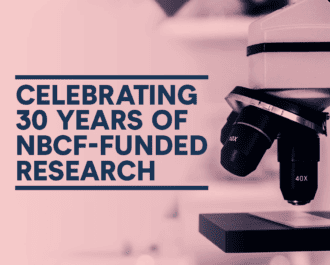 Treat
Treat
Incremental discoveries happen all the time in breast cancer research, and with so many scientists around the world dedicated to understanding and finding the cure for breast cancer, there is such a wealth of information on potential new ways of detecting and treating the disease.
Researchers are tackling breast cancer from all angles, trying to understand the biology of cancer, why it develops and how it survives and spreads to other parts of the body. Others are searching for ways to enhance risk assessments, treatment combinations and to improve quality of life.
With Breast Cancer Awareness Month upon us, here at the National Breast Cancer Foundation we’d like to share with you the results of some recent research projects from around the globe which are adding to our combined knowledge of this complex disease.
How starving cancer cells of sugar could be the best way to attack them
Cancer researchers have known for decades that tumours use a faster metabolism compared to normal cells in our body. One classic example of this is that cancer cells increase their consumption of glucose to fuel their rapid growth and strike against programmed cell death. This means that limiting glucose consumption in cancer cells is becoming an attractive tool for cancer treatments.
However, it’s not as simple as cutting sugar out of our diet. Cancer cells always find alternatives to fuel their tank of glucose, no matter how little sugar we ingest. There is not a direct connection between eating sugar and getting cancer.
A recent study published in Nature Communications showed that cancer cells stimulate the over-production of the protein known as PARP14, enabling them to use glucose to turbocharge their growth and override the natural check of cell death. Using a combination of genetic and molecular biology approaches, researchers have also demonstrated that inhibiting or reducing levels of PARP14 in cancer cells starves them to death.
Researchers have taken an important step towards understanding why some primary breast cancers return while others do not – they have found genetic factors driving cancers that recur are different from those found in the cancers that do not. This discovery could enable doctors to identify patients at high risk of their cancer returning and to target the genes responsible for recurrence when the cancer is first diagnosed in order to prevent its return.
NBCF note: Metastatic breast cancer is currently an incurable genetic disease, and we don’t yet understand how the cancer cells mutate and relapse. NBCF is currently funding a program at the Peter McCallum Cancer Centre in Melbourne using state-of-the-art genetic sequencing technology and new bioinformatics methods to investigate the genetics of metastatic disease. This has the potential to uncover why metastatic disease is incurable with our current treatments and also could change our thinking about the management of metastatic disease.
Cancer decoy could attract and capture malignant cells
A small, implantable device that researchers are calling a cancer ‘super-attractor’ could eventually give doctors earlier warnings of relapse in breast cancer patients and even slow the disease’s spread to other organs. The sponge-like device developed at the University of Michigan is designed to attract cancer cells that emerge in the bloodstream during the early stages of cancer’s recurrence — before tumours form elsewhere in the body.
A new study shows that the device attracts detectable numbers of cancer cells before they’re visible anywhere else. When the super-attractor was implanted just beneath the skin of the mice in the study, their cancer-compromised immune systems responded as they would to any foreign object, sending out cells to attack the intruder. Cancer cells were then attracted to the immune cells within the device, where they took root in tiny pores designed to be hospitable to them.
NBCF note: NBCF funds quite a few research projects in the area, many of which are ‘novel concept’ projects where the researchers have the funds to try something new and innovative. For example, one of our Brisbane-based researchers is developing a prototype chip that connects to a smart phone – patients prick their finger on the end of the chip which ‘reads’ the level of tumour DNA in the blood and displays the results on the screen, and also sends the data to their treating clinician, flagging any follow-up required.
Biomarker may predict who’ll benefit from targeted therapy for HER2-negative breast cancer
Researchers have demonstrated that brief exposure to a targeted therapy can tell doctors which HER2-negative patients will respond – and which should switch to another kind of treatment. HER2 (human epidermal growth factor) is a protein that can affect the growth of some cancer cells and most patients with metastatic breast cancer have HER2-negative breast cancer. If HER2-negative breast cancer is also hormone receptor positive, the most common treatment is hormonal therapy, but chemotherapy or targeted therapy may also be given.
If confirmed in clinical trials, the discovery would provide physicians valuable information regarding the effectiveness of the currently available drug bevacizumab. Such early results would spare patients weeks of the medication’s sometimes severe side effects, and also allow them to pursue options with greater chances for success.
What all this means is that they have identified a signature that shows which patients are likely to respond to bevacizumab and chemotherapy and can identify those patients within 15 days of the very first dose they receive.
NBCF note: This research is another compelling example of the concept of ‘personalised medicine’ – working out which combination of treatments will work for individual patients. Given that few medications are equally effective in all patients, scientists now are seeking ways to determine which medication works best with whom, seeking to provide clinicians with the tools/tests that will tell them how the patient is responding or otherwise, and why so they can quickly make alterations to treatment.
An NBCF-funded researcher in Melbourne, Dr Sarah-Jane Dawson is also investigating the circulating tumour DNA in blood as a personalised biomarker in breast cancer. Biomarkers are characteristic biological properties or molecules that can be detected and measured in parts of the body like the blood or tissue – if researchers can determine the presence of a specific biomarker, they can develop a test for it.
New approach found to tackle breast cancer hormone therapy resistance
UK researchers have discovered a new explanation as to why women with oestrogen receptor positive (ER+) breast cancer develop resistance to hormone treatment, and a potential new approach to overcome the problem.
Around 80% of breast cancers are ER+ and are treated with anti-oestrogen therapies such as tamoxifen and aromatase inhibitors. But around one in five of these cases recur within 10 years, and nearly all advanced cases develop resistance, which is why it’s so important that we continue to learn more about how the disease finds ways to survive in some patients and not others.
The study team found that while short-term treatment with anti-oestrogen drugs decreased tumour growth, it increased the activity of breast cancer stem cells. They found that these stem cells were driven by a signal called NOTCH4. In patient tumours, having high levels of NOTCH4 before treatment was linked to breast cancer spread and worse survival outcomes.
Based on these results the authors believe it is important to investigate the benefit of adding progesterone to medications which target the estrogen receptor. This could provide a cheap and safe drug that could potentially improve treatment for half of all breast cancer patients.
NBCF note: We are funding research into why oestrogen receptor positive (ER+) breast cancers develop resistance to hormone treatment, resulting in relapse. Dr David Gallego-Ortega from The Garvan believes that if a newly discovered protein (Elf5), which promotes resistance to hormone treatment, can be blocked it will dramatically reduce the risk of cancers metastasising.
More News Articles
View all News Treat
Treat

